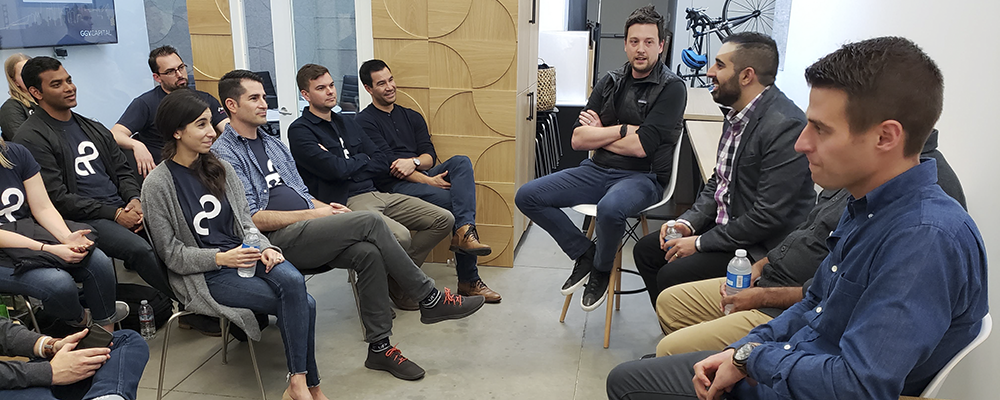You’ve probably read an article on Vox. Perhaps you’ve taken an online course with Udemy or used InVision’s platform to design a new app. All of these businesses are known for seamless interfaces that customers have come to rely on. Internally, they all rely on the same secret weapon: the Tray Platform.
By leveraging Tray.io’s powerhouse General Automation Platform, professionals in any role can easily integrate and automate software applications to create smoother workflows—empowering organizations to grow faster. To maintain this reputation and scale such a robust product, Tray.io has its own secret weapon: GitHub. According to Tray.io Director of Engineering Alberto Giorgi, GitHub Team has proved “essential” in scaling the business. In less than a couple of years, the team has grown from 20 to 200+ people across offices in London and San Francisco.
With GitHub Team’s collaboration tools, Tray.io engineers have been able to build and ship code faster, growing the team from 10 to 80 engineers in one year and a half. Every month, the Tray Platform processes up to 10 billion tasks, each in fractions of a second. “The ability to scale the system and respond to very large amounts of data is of utmost importance,” said Engineering Manager Alex Carver. GitHub Team allows this work to happen efficiently—and most importantly, “without the customers having to worry about it,” said Carver.

Since the company offers a low-code General Automation Platform, it’s important for Tray.io to be able to automate its own software workflows. Rather than jumping between dozens of tools—and having to click a thousand buttons—the Tray.io team uses webhooks within GitHub Team to launch it’s workflows and automate laborious processes. This “extra velocity of automation is unparalleled,” said Test Engineer Rick Schubert.
GitHub enables our developers to focus on what really matters. Shipping high-quality, secure code.
Like many of his colleagues, Carver has worked with GitHub for such a long time that it’s become integral to his everyday routine, and makes running next-level DevOps easier. “It’s a bit hard to step back and say how we’d work without it,” he said. The whole team speaks GitHub, which matters when productivity is on the line. “If we were using a different tool that wasn’t as accessible and easy to use as GitHub Team, it would definitely slow down the work,” he said. From junior-level employees to senior managers, all of the engineers and developers at Tray.io can collaborate easily with the tools they already know and love. GitHub also acts as an essential recruiting tool. “As a tech company, having a strong brand on GitHub is quite important for attracting talent and increasing onboarding speed,” shared Carver.
As an Engineering Manager, it is essential for Carver to have “one single point of view,” he says, “so people across all teams know where to go.” Whether engineers are writing, pushing, or editing code, “everything stays in GitHub,” including documentation. This minimizes context switching and ensures “people across all teams know exactly where to go.” As a Test Engineer, Schubert’s team has hundreds of different connectors, so he was used to having bad documentation—but GitHub has given his team visibility on every version of the code so they can effectively maintain quality control. This means they can peer review faster, which allows for “quick turnarounds in an already tight development loop.” They produce a more consistent, stable product at a faster release rate.
To ensure its code is secure from blueprint to execution, Tray.io uses some of GitHub Team’s most sophisticated protection and compliance solutions. Every day, GitHub checks files for outdated requirements and automatically fixes vulnerabilities. “We find this very valuable,” says Giorgi. “GitHub’s automated security updates are smarter than any other vulnerability tracking tools we’ve used.” With permissions access tools and two-factor authentication, the engineering team can build confidently, and monitor security and changes along the way. On Schubert’s team, they use a lot of branch protection rules. “Our security analysts have an automated workflow where they can see or guard the branch protection rules of all the branches on all repositories”—of which there are about 300. GitHub Team allows them to check whether certain branches should have stricter requirements and adjust permissions along the way.

Security and automation are just part of the equation. For Carver, GitHub Team is also a “kind of genius” software management tool. Using GitHub Team’s code review assignment features, Carver can balance the workload across his 80-person engineering team. When he assigns and schedules pull requests to a group of people, it automatically equalizes the work. Innersource best practices, including keeping repositories open, encourage engineers to reuse code and increase visibility, which sets the stage for innovation and agility. “Anyone can learn something from another team and quickly see what’s in the code,” said Giorgi. Since other Tray.io teams also use GitHub, Carver’s team can work cross-functionally within the organization, collaborating with customer success, design, and growth marketing to create a better product. “Having a fairly open structure allows people to get involved quite easily and quickly,” said Giorgi.
GitHub’s open source presence brings Tray.io’s collaborative efforts to the next level. “That’s where the visibility is best,” said Giorgi. “People can get excited about the project and it can grow and others can use it.” The open environment expands the team’s expertise and empowers others to get involved in Tray.io projects. Currently, Tray.io’s engineers are contributing to projects owned by Gatsby, which provides a framework for building fast websites and apps. By collaborating, Tray.io hopes to create an end product that’s better for not just both companies, but anyone in the open-source world.
From automation and security to world-class collaboration and a next-level DevOps ecosystem, GitHub Team has helped Tray.io build a robust platform. As the team continues to scale its product, GitHub Team will help them grow their code and community in lockstep. “GitHub enables our developers to focus on what really matters,” explained Giorgi. “Shipping high-quality, secure code.”
 GitHub Team
GitHub Team


